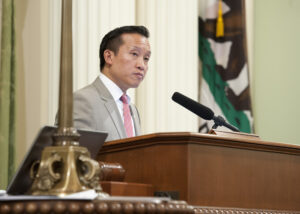City argues banning of toxic substance should be a top environmental justice priority
SAN FRANCISCO (March 21, 2022) — San Francisco City Attorney David Chiu joined local governments and entities in submitting a letter today urging the Environmental Protection Agency (EPA) to take regulatory action to protect communities from lead exposure by banning leaded aviation fuel. The letter described the ways leaded aviation fuel contributes to air pollution that endangers public health and urged the agency to make an affirmative endangerment finding for leaded aviation gasoline, a basis for banning the toxic additive.

“We have known about the devastating effects of lead poisoning for decades,” said San Francisco City Attorney David Chiu. “The EPA needs to take the long-overdue step of banning the lead in aviation fuel that is harming public health and the environment.”
After a decade of promising to address the toxic harms caused by lead in aviation fuel, the EPA opened an investigation into the matter and announced on January 12 that it would propose an endangerment finding for leaded aviation fuel under Section 231 of the Clean Air Act. An endangerment finding means the agency can assert that the pollution from leaded aviation fuel endangers public health or welfare and gives the EPA a basis for phasing out the substance.
The dangers of lead pollution are clear and well documented. Lead exposure can cause a number of adverse health conditions, particularly for children who are exposed. The pollution caused by leaded aviation fuel can have safety impacts on airport workers as well as the communities surrounding airports, which are often already disproportionately impacted by air pollution.
In the United States, leaded gasoline was phased out in the 1970s and eventually banned outright in 1996. Leaded aviation fuel is the last remaining leaded fuel in use in the country.
For a variety of reasons, state and local governments are limited in their ability to regulate aviation fuel additives. Preemptions in federal law, difficulties sourcing unleaded fuels, and costs associated with additional fueling infrastructure, mean that a ban of lead in aviation fuel could realistically only occur at the federal level.
The EPA has said it will issue the proposed endangerment finding by the end of 2022, solicit comment on the proposal, and finalize the finding in 2023. A copy of the letter can be found here.
###
